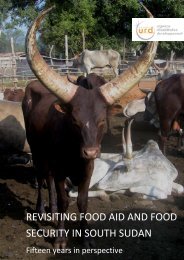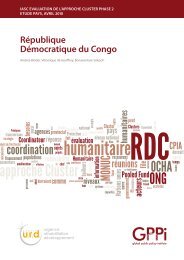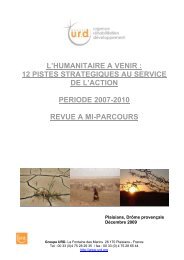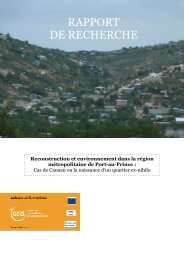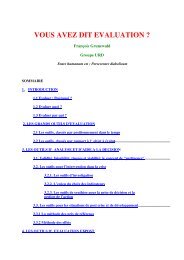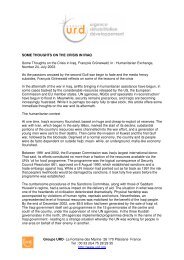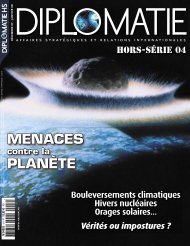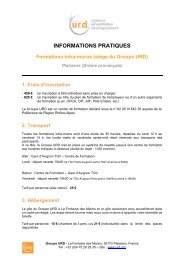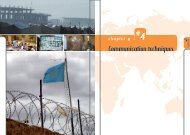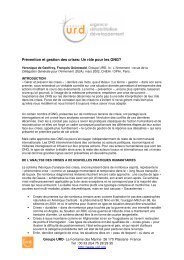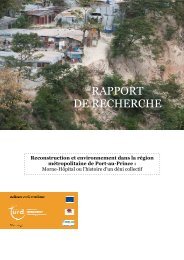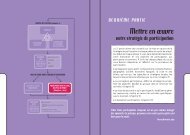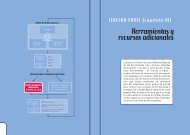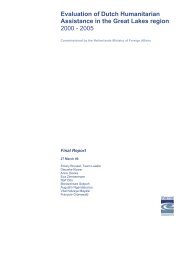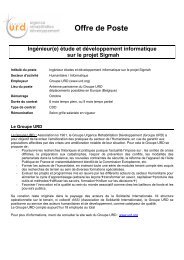Kabul Urban Survey - Groupe URD
Kabul Urban Survey - Groupe URD
Kabul Urban Survey - Groupe URD
Create successful ePaper yourself
Turn your PDF publications into a flip-book with our unique Google optimized e-Paper software.
Protocol between MUDH and KM, Office of the President, Elected Council of the KM or<br />
an Inter-ministerial Planning Board?”<br />
- Defining what type of urban plan should be devised “A Structure Plan, Strategic<br />
Development Plan, or a revised Master Plan? Which groups of people should participate?<br />
How can we strengthen the planning capacity of different urban actors?”<br />
Recommendations put forward by Pathak in 2006<br />
1. Institutional issue: Institutional clarity on planning responsibility, funding and capacity.<br />
2. Local governance for <strong>Kabul</strong> city, not at a national level. Therefore, KM should be the<br />
lead agency for master planning and development planning for <strong>Kabul</strong> city. This should be<br />
endorsed by appropriate legal provision.<br />
3. Need for joint decisions on national infrastructure in <strong>Kabul</strong>. Planning decisions on<br />
issues of national interest, such as airports, highways, international, national buildings<br />
and international missions, should be taken jointly by the national government, concerned<br />
ministries and KM.<br />
4. Participatory process “engage with the key partners and stakeholders, including the<br />
citizens and civil society”<br />
5. The capacity of KM staff could be strengthened by external technical assistance<br />
6. Need to strengthen KM engineer and architect’s planning capacity. … More Afghan<br />
professionals trained as urban and town planners need to be recruited to strengthen<br />
these departments.<br />
7. A Regional Development Plan has to be established with “… an Inter-ministerial Regional<br />
Planning Board and a fully equipped Regional Planning Team at MUDH.<br />
8. “An ideal planning process would be to prepare a City Development Strategy followed<br />
by a Master Plan or a number of Detail <strong>Urban</strong> Plans as considered possible given<br />
the available resources and priority of <strong>Kabul</strong> city.”<br />
9. It should be approved by An Inter-ministerial Committee or Board.<br />
4.3 <strong>Kabul</strong> urban policy issues according to the WB<br />
The differing points of view between the international aid community and Afghan urban<br />
authorities, and also within the various Afghan urban institutions with regards to where the<br />
priorities lie, have caused major delays in starting the aid process. The World Bank (WB) is<br />
playing a major role in bringing together funds for the reconstruction process. Several<br />
funding mechanisms are still ongoing for reconstruction needs, but the Afghan urban<br />
institutions have not yet succeeded in absorbing a large proportion of these budgets under<br />
the conditions stipulated by donors. The complexity of the situation and the difficulties<br />
involved in achieving a consensus on priorities between the different urban stakeholders,<br />
have prompted WB to launch a series of economic and technical analysis with external<br />
expertise. The WB has produced a number of documents measuring the requirements in<br />
terms of budget. Here we try to understand some of the difficulties and challenges of urban<br />
issues in term of programmes, rather than in financial terms. We also look at WB’s<br />
observations and the arguments and recommendations put forward with a view to prioritising<br />
urban decisions within the present financial context. In January 2006, the WB presented the<br />
results of their analysis, their recommendations, and what they see as being the priorities in<br />
a series of “<strong>Kabul</strong> <strong>Urban</strong> Policy Notes” 16 . They highlight the following recommendations:<br />
- “<strong>Kabul</strong> <strong>Urban</strong> land crisis : A summary of issues and recommendations”<br />
- “Why and how should <strong>Kabul</strong> upgrade its informal settlements”?<br />
- “Should <strong>Kabul</strong> grow by expanding to a new town or by building up its existing suburbs”<br />
- “What are the sources of conflict in urban land tenure?”<br />
- “Will formal documents of title and the courts resolve all land disputes?”<br />
- “Conflicts over property rights and resolution of disputes in <strong>Kabul</strong> Conclusions”;<br />
16 World Bank (Author: wb297073], 2006, <strong>Kabul</strong> <strong>Urban</strong> Policy Notes<br />
Page 36



